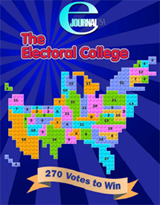 |
|
| 2008 Elections For more information: Inauguration |
|
The Electoral CollegeAmerican voters elect the President and Vice President of the United States indirectly, through an arrangement known as the Electoral College system. The Electoral College system comprises a complex mosaic of constitutional provisions, state and federal laws, and political party rules and practices. Although the Electoral College system has delivered uncontested results in 46 out of 50 presidential elections since it assumed its present constitutional form in 1804, it has been the subject of persistent criticism and frequent proposals for reform. Reform advocates cite several problems with the current system, including a close or multi candidate election can result in no electoral college majority, leading to a contingent election in Congress; the current system can result in the election of a President and Vice President who received a majority of electoral votes, but fewer popular votes, than their opponents; the formula for assignment of electoral votes is claimed to provide an unfair advantage for less populous states and does not account for population changes between censuses; and the winner-take-all system used by most states does not recognize the proportional strength of the losing major party, minor party, and independent candidates. On the other hand, defenders assert that the Electoral College system is an integral and vital component of federalism, that it has a 92% record of non-controversial results, and that it promotes an ideologically and geographically broad two-party system. They maintain that repair of the Electoral College system, rather than abolition, would eliminate any perceived defects while retaining its overall strengths. Proponents of presidential election reform generally advocate either completely eliminating the electoral college system, replacing it with direct popular election, or repairing perceived defects in the existing system. (Source: Congressional Research Service) United States Constitution Article II Section 1. The executive power shall be vested in a President of the United States of America. He shall hold his office during the term of four years, and, together with the Vice President, chosen for the same term, be elected, as follows: Each state shall appoint, in such manner as the Legislature thereof may direct, a number of electors, equal to the whole number of Senators and Representatives to which the State may be entitled in the Congress: but no Senator or Representative, or person holding an office of trust or profit under the United States, shall be appointed an elector. The electors shall meet in their respective states, and vote by ballot for two persons, of whom one at least shall not be an inhabitant of the same state with themselves. And they shall make a list of all the persons voted for, and of the number of votes for each; which list they shall sign and certify, and transmit sealed to the seat of the government of the United States, directed to the President of the Senate. The President of the Senate shall, in the presence of the Senate and House of Representatives, open all the certificates, and the votes shall then be counted. The person having the greatest number of votes shall be the President, if such number be a majority of the whole number of electors appointed; and if there be more than one who have such majority, and have an equal number of votes, then the House of Representatives shall immediately choose by ballot one of them for President; and if no person have a majority, then from the five highest on the list the said House shall in like manner choose the President. But in choosing the President, the votes shall be taken by States, the representation from each state having one vote; A quorum for this purpose shall consist of a member or members from two thirds of the states, and a majority of all the states shall be necessary to a choice. In every case, after the choice of the President, the person having the greatest number of votes of the electors shall be the Vice President. But if there should remain two or more who have equal votes, the Senate shall choose from them by ballot the Vice President. The Congress may determine the time of choosing the electors, and the day on which they shall give their votes; which day shall be the same throughout the United States. No person except a natural born citizen, or a citizen of the United States, at the time of the adoption of this Constitution, shall be eligible to the office of President; neither shall any person be eligible to that office who shall not have attained to the age of thirty five years, and been fourteen Years a resident within the United States." Constitution See also: | ||
|
||
| Texts are abridged from U.S. State Department IIP publications and
other U.S. government materials. |
| DISCLAIMER Any reference obtained from this server to a specific commercial product, process, or service does not constitute or imply an endorsement by the United States Government of the product, process, or service, or its producer or provider. The views and opinions expressed in any referenced document do not necessarily state or reflect those of the United States Government. |
 U.S. Diplomatic Mission to Germany /Public Affairs/ Information Resource Centers Updated: August 2008 |
